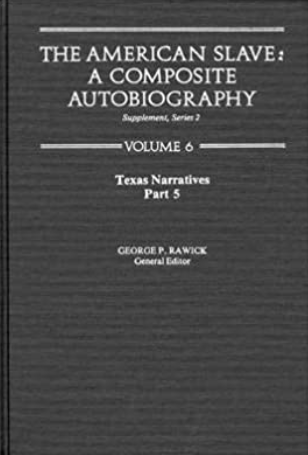“The phalanx of interviewers…”
Actually, more than only Wright and Hurston.
Stewart, C. A. (2016). Long Past Slavery: Representing Race in the Federal Writers' Project, University of North Carolina Press, Baltimore, p. 35.
“…‘composite autobiography’…”
“Composite Autobiography” was not applied to the original series of slave narratives, comprising seventeen volumes, or thirty-three total books’ worth, of material. The term was applied several decades later when George Rawick edited material that had initially been culled from the project—twenty-two additional books, in two batches, Supplemental Series 1 and 2, appeared in the 1970s, under the title The American Slave: A Composite Autobiography. I assume Rawick is the originator of the term.
Rawick, G. P. (1974). The American slave: A composite autobiography. Westport, Conn: Greenwood.
“…historians and creative writers.”
This observation was made by one of the associate directors of the program, in response to an early series of narratives produced in Florida—which inspired the project to go nationwide. The letter is quoted in Catherine Stewart’s excellent book about the project, Long Past Slavery.
Stewart, C. A. (2016). Long Past Slavery: Representing Race in the Federal Writers' Project, University of North Carolina Press, Baltimore, p. 62.
“… ‘Anaka’ and ‘Anarcky.’”
See “…come to be known as Anarcha,” above.
Anarcha’s name first appears as “Anaka” in 1828, and as “Anarcky,” in 1841. Images of her name as it appeared in the original Westcott plantation documents, held at the Montgomery County Archives in Montgomery, AL, are reproduced in Chapter One and Chapter Six of the printed book.
“ ‘Anarcha’ itself is a specter…”
See “…come to be known as Anarcha,” above.
I know of no earlier instance of the name “Anarcha” than Sims’s posthumous autobiography, The Story of My Life, published two years after his death, in 1885.
The only time Anarcha’s name appears in Sims’s own handwriting, the name is spelled “Anarca,” and is included in Chapter Nine of the printed book. The same spelling would be used when Anarcha was admitted to Woman’s Hospital, and appears in the printed book in Chapter Eleven.

